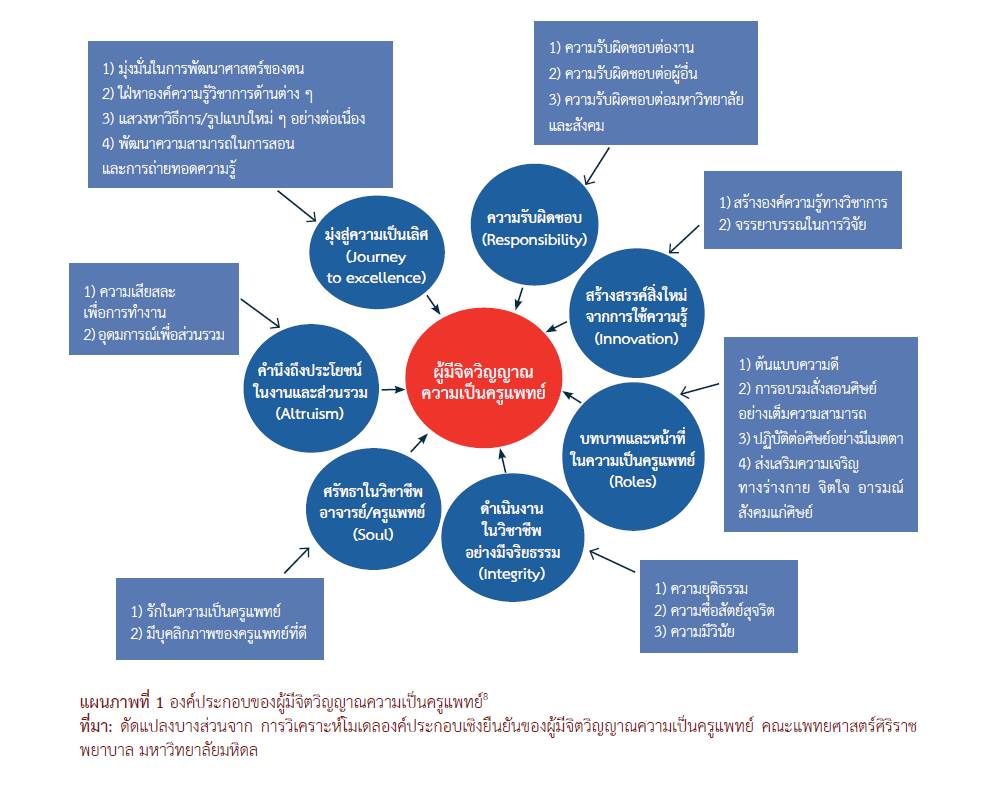The Development of Spirituality of Medical Teachers
Main Article Content
Abstract
A medical teacher is a person who teaches doctors by transferring professional knowledge to students. In addition, medical teachers also help raise the mindset and spirit of a doctor to make students become quality members of society through the process of teaching and learning. Therefore, the development of a medical teacher's spirit is an important tool in preparing personnel to have the characteristics or elements of a medical teacher's spirit. Faculty development must start by stimulating the importance and need to be driven both at the individual level, such as the gathering of people with passion, giving feedback and reflection, and making changes at the policy level, such as setting clear directions, listening to problems, assessment criteria, motivation. Guidelines for faculty development include formal teaching such as short course training, elective courses, seminars, educational projects, and informal teaching such as exchanging experiences from role models, mentoring, peer teaching. This can be done for both novice and senior teachers or can be started from residents or medical students, but the content to be developed should be chosen according to the level of learners and continuous development. In addition, there must be various support such as policy, the budget and agencies that support the faculty development to have the spirit of medical teachers such as the Faculty of Medicine Siriraj Hospital established SHEE and developed it through the SHEE programs.
Article Details

This work is licensed under a Creative Commons Attribution-NonCommercial-NoDerivatives 4.0 International License.
References
Harden RM, Crosby J. AMEE Guide No 20: The Good Teacher Is More Than a Lecturer - The Twelve Roles of The Teacher, Med Teach 2000; 22:4, 334-347.
Kikukawa M, Nabeta H, Ono M, Emura S, Oda Y, Koizumi S, Sakemi T. The Characteristics of a Good Clinical Teacher as Perceived by Resident Physicians in Japan: A Qualitative Study. BMC Med Educ 2013; 13: 100.
Shaterjalali M, Yamani N, Changiz T. Who Are the Right Teachers for Medical Clinical Students? Investigating Stakeholders’ Opinions Using Modified Delphi Approach. Adv Med Educ Pract 2018; 9: 801-809.
อารยา พรายแย้ม. การสังเคราะห์ความรู้ทางด้านการพัฒนาจิตปัญญา (วิญญาณ) จากเรื่องเล่าความสำเร็จของผู้ให้บริการและผู้รับบริการในระบบสุขภาพ (รายงานผลการวิจัย). กรุงเทพฯ: มูลนิธิสดศรี-สฤษดิ์วงศ์; 2552.
Dombeck M, Karl J. Spiritual Issues in Mental Health Care. J Relig Health 1987; 26: 183–197. doi: 10.1007/BF01533119.
Jiang Y. A study on Professional Development of Teachers of English as a Foreign Language in Institutions of Higher Education in Western China. 1st ed. Berlin: Springer; 2017. doi:10.1007/978-3-662-53637-7
พัชดาพรรณ อุดมเพ็ชร. ประสบการณ์ของอาจารย์แพทย์ผู้มีจิตวิญญาณความเป็นครูแพทย์. ใน: การประชุมวิชาการระดับชาติ มหาวิทยาลัยรังสิต ประจําปี ๒๕๖๑ (RSU National Research Conference 2018); วันที่ วันที่ 4 พฤษภาคม 2561; ณ อาคารพิฆเณศ Student Center (ตึก 6) มหาวิทยาลัยรังสิต. กรุงเทพฯ: มหาวิทยาลัย; 2561. น. 462-469.
ภัทรพร นาคนาเกร็ด และเกียรติยศ กุลเดชชัยชาญ. การวิเคราะห์โมเดลองค์ประกอบเชิงยืนยันของผู้มีจิตวิญญาณความเป็นครูแพทย์ คณะแพทยศาสตร์ศิริราชพยาบาล มหาวิทยาลัยมหิดล. ใน: การประชุมวิชาการระดับชาติ ศึกษาศาสตร์วิจัยครั้งที่ 8 และนานาชาติ ครั้งที่ 4; วันที่ 1-2 มิถุนายน 2564; ณ คณะศึกษาศาสตร์ มหาวิทยาลัยสงขลานครินทร์. สงขลา: มหาวิทยาลัย; 2564. น. 411-425.
Steinert Y. Faculty Development: Core Concepts and Principles: Faculty Development in the Health Professions. Dordrecht: Springer; 2014. p. 3-49. doi. 10.1007/978-94-007-7612-8.
Gruppen LD, Simpson D, Searle NS, Robins L, Irby DM, & Mullan PB. Educational Fellowship Programs: Common Themes and Overarching Issues. Acad Med 2006; 81(11): 990–994. DOI: 10.1097/01.ACM.0000242572.60942.97.
Swanwick T. See One, Do One, Then What? Faculty Development in Postgraduate Medical Education. Postgrad Med J 2008; 84(993): 339-43. doi: 10.1136/pgmj.2008.068288.
Schofield S J, Bradley S, Macrae C, Nathwani D, Dent J. How we encourage faculty development. Med Teach 2010; 32(11): 883-6. doi: 10.3109/0142159X.2010.506564.
Academy of Medical Educators. Professional Standards for Medical, Dental and Veterinary Educators. [Internet]. 4th ed. Cardiff: Academy of Medical Educators; 2021 [cited 2022 Apr 10]. Available from: https://www.medicaleducators.org/write/MediaManager/Documents/AoME_Professional_Standards_4th_edition_1.0_(web_full_single_page_spreads).pdf
Burgess A, Matar E, Neuen B, Fox G J. A Longitudinal Faculty Development Program: Supporting A Culture of Teaching. BMC Med Educ. 2019 ;19(1): 400. doi: 10.1186/s12909-019-1832-3.
Hammond LD, Hyler ME, Gardner M. Effective Teacher Professional Development. Learning Policy Institute. [online]. 2017. Available from: https://files.eric.ed.gov/fulltext/ED606743.pdf
Hussein A, Shirah B, Alshawwa L, Tekian A, Norcini. Factors To Be Considered in Designing a Faculty Development Program for Medical Education: Local Experience from The Western Region of Saudi Arabia. Yeungnam Univ J Med 2020;37(3): 210-216. doi: 10.12701/yujm.2020.00115.
Yilmaz Y, Durak H, Yildirim S. Enablers and Barriers of Blended Learning in Faculty Development. Cureus. 14(3): e22853. doi:10.7759/cureus.22853.
Yilmaz Y, Lal S, Tong XC, Howard M, Bal S, Bayer I., et al. Technology-Enhanced Faculty Development: Future Trends and Possibilities for Health Sciences Education. Med Sci Educ 2020; 30(4): 1787-1796. doi: 10.1007/s40670-020-01100-1.






